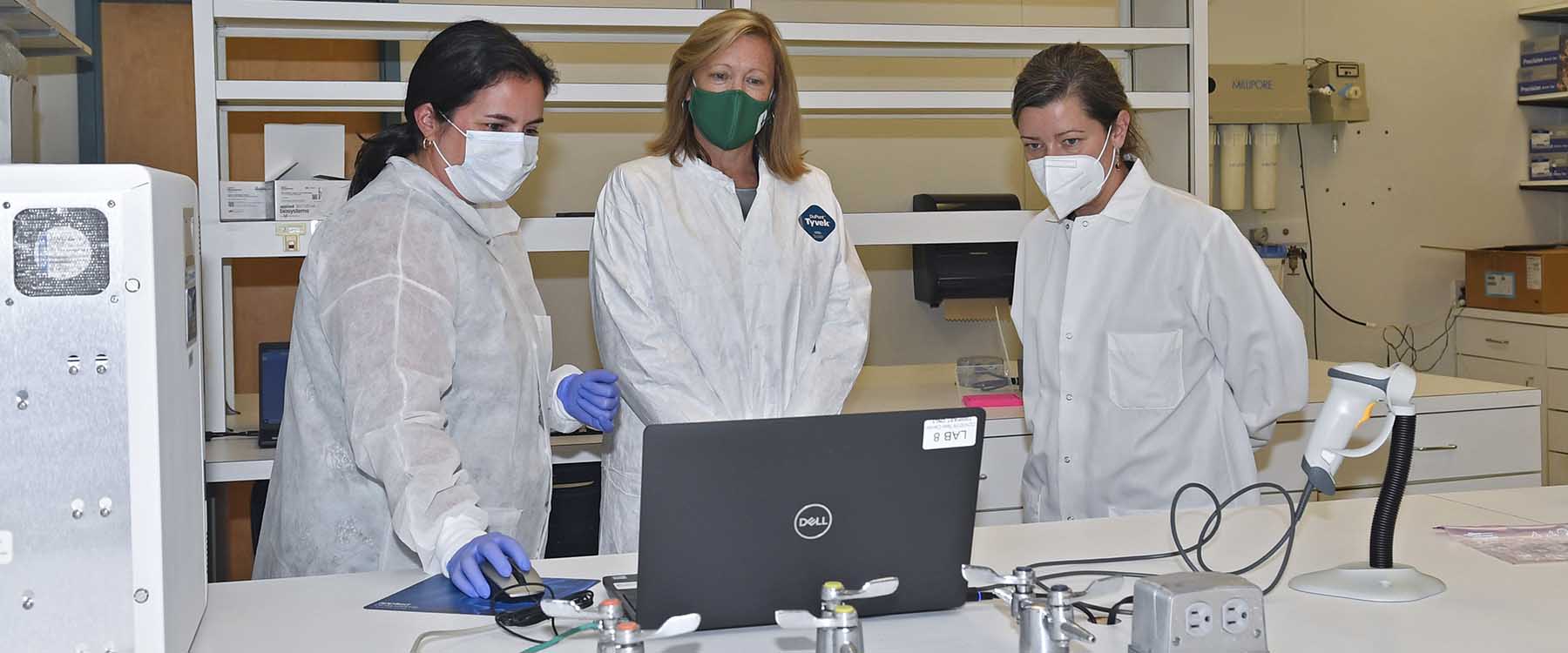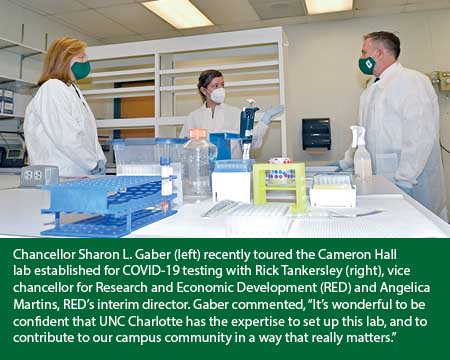
While conversations and planning were underway at UNC Charlotte this summer to determine whether students would return to campus or continue with virtual classes due to COVID-19-related concerns, and as protocols, equipment and supplies for the safest possible on-campus learning and living experience were put into place, a parallel set of opportunities developed to make possible the tracking, testing and tracing of coronavirus on campus.
The process includes a number of essential and coordinated components designed to mitigate the presence of COVID-19 at UNC Charlotte. The University’s well-documented wastewater sampling and testing process is one. As is the digital tool, Niner Health Check, developed by the Office of OneIT, which prompts students, faculty and staff daily to report COVID-19 status or symptoms. Also, through a collaboration between the Student Health Center and the Office of Research and Economic Development, on-campus COVID-19 testing is available for members of the University community who are referred based on their Niner Health Check responses or by the campus-based contact tracing team.
A key element: A campus lab for processing COVID-19 tests
 In a Cameron Hall laboratory, the COVID-19 tests administered by the Student Health Center are being processed and, by virtue of this specific lab’s singular purpose, providing answers awaited by those tested for COVID-19 as well as faculty and staff responsible for contact tracing, moving affected students to quarantine or isolation and updating the University’s COVID-19 dashboard.
In a Cameron Hall laboratory, the COVID-19 tests administered by the Student Health Center are being processed and, by virtue of this specific lab’s singular purpose, providing answers awaited by those tested for COVID-19 as well as faculty and staff responsible for contact tracing, moving affected students to quarantine or isolation and updating the University’s COVID-19 dashboard.
“There existed a University-wide willingness to create a COVID-19 test processing lab to provide fast, accurate and timely results, especially with the supply chain challenges that hospitals and testing facilities across the country have experienced, ” said Angelica Martins, interim director, Research and Economic Development, who is directing the COVID-19 Testing Center.
The lab — whose site was chosen because of its central campus location, size and configuration ideal for preventing the cross-contamination of testing samples — obtained CLIA (Clinical Laboratory Improvement Amendments) certification this summer, making it eligible to accept human samples for diagnostic testing according to the regulations of the Center for Medicare and Medicaid Services. (The federal agencies responsible for CLIA are the Food and Drug Administration, Center for Medicare and Medicaid Services, and the Centers for Disease Control and Prevention.)
CLIA certification required ventilation upgrades to assure a correct air exchange rate. Additionally, the lab team, in collaboration with OneIT, installed software programs designed to support clinical and laboratory workflow, laboratory outreach, point-of-care testing, data analytics and HIPAA security.
“We were able to accomplish in four weeks what typically takes six to 12 months,” said Martins.
Through August and most of September, with no students on campus due to the decision to delay student move-in and the start of in-person classes, lab personnel ran COVID-19 samples provided by Atrium Health to test the campus facility. The lab, prepared to complete 200 samples per day, is able to increase its workflow, if needed, to accommodate up to 800 samples daily.
“This flexibility is important should we experience a surge in people experiencing COVID-19 symptoms,” said Rick Tankersley, vice chancellor for Research and Economic Development.
Preparation Pays Off
All parts of the tracking, testing, tracing process were put to the test recently when the wastewater testing and sampling researchers detected positive signs of COVID-19 in samples drawn from a campus residence hall. Residents were asked to remain in the building or return for testing. Once testing started, the Student Health Center staff worked closely with Residence Life and Housing to collect nasal swab samples from the residence hall’s 162 occupants within a 90-minute timespan.
The collected samples were transported to the Cameron Hall laboratory. The team there was able to provide results within six hours with positive results occurring for less than 1% of the residence hall population. Those with positive results were moved quickly to isolation, while the contact tracing team identified close contacts, who were immediately moved to quarantine. The remaining students were cleared to return to their activities a little more than 24 hours after their initial notification.
“By all accounts, the wastewater testing plan and protocol we've been working on over the last several months worked. We were able to quickly identify the location of a potential outbreak prior to the onset of symptoms, test a large group of students within 24 hours, identify anyone infected and their close contacts, and isolate them before there was significant transmission — or a COVID-19 cluster emerged,” said Tankersley. “We can’t know for sure, but I'm confident a coronavirus outbreak was successfully avoided on UNC Charlotte's campus.”